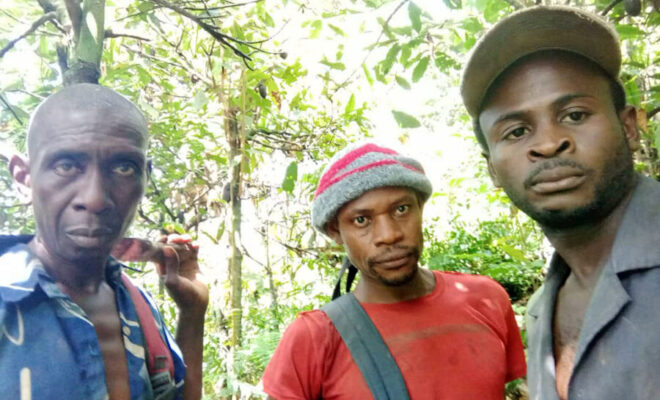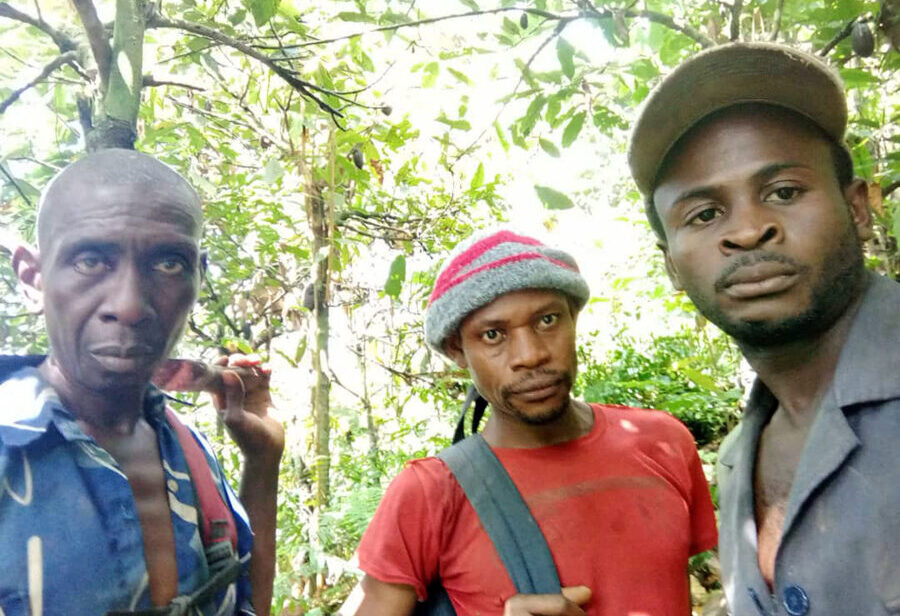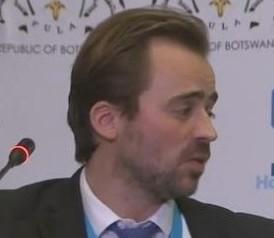Meet Cameroon’s undercover conservationists

When the Anglophone war broke out, state rangers left, militias set up camp in forests, and thousands sought refuge in areas of critical biodiversity.

Nkemkedju Andreas (right) with his colleagues in conservation in the Tofola Hill Wildlife Sanctuary, Cameroon. Credit: ERuDeF.
As Nkemkedju Andreas and his fellow community rangers snake through the dense forest, they keep an eye out for snare traps and signs of human activity. The area they are patrolling – the Tofala Hill Wildlife Sanctuary – is home to several critically endangered species and considered one of the most important biodiversity hotspots in the world. They keep their eyes and ears peeled, ready to rescue animals from would-be poachers.
As they go about their routine patrol, however, Nkemkedju and co are also wary of crossing the path of another creature fighting for survival: the Red Dragons. Despite their name, these are not an endangered species or even animals. Rather, they are members of a feared separatist militia fighting a war of independence against the Cameroonian state. Along with the endangered cross-river gorilla, Nigeria-Cameroon chimpanzee, elephants, and pangolins, the Red Dragons now call this precious forest home too.
As such, the conservationists must take certain unique precautions. For one, they operate undercover, in plainclothes. “If we put on the normal attire of rangers, we will be taken for government rangers, something Anglophone armed militias don’t want to see,” says Nkemkedju, 33.
Since war erupted in 2017, life in Cameroon’s Northwest and Southwest regions – where English-speaking predominates, unlike in the other eight French-speaking regions – has been turned upside down. At least 6,000 civilians have been killed by government or separatist forces. Countless villages have been razed. Rebels have violently enforced a boycott on education, attacking schools and students. And 600,000 people have been displaced.
While these tragedies have received little international attention, the ways in which these human pressures have led to environmental pressures have received even less. Scientists suggest they could be devastating. Since the war began, conservation projects have ground to a halt. State rangers and NGOs have fled the area. And, according to recent research published in the Journal of Humanitarian Action, 80% of villagers in conflict zones have sought refuge in nearby biodiversity hotspots.
Like the militias hiding out in the forests, these displaced communities have had to rely on hunting and harvesting to survive. They have cut down valuable trees to build homes, use as firewood, and clear space for farms.

Akande Tamon is a rural and environmental engineer. He is particularly concerned about the effect of tree clearing in watersheds, critical areas of land that drain into river systems. “Watersheds are currently massively being deforested and converted to farmlands,” he says. He suggests these changes have led to acute water shortages, especially in the dry season, and fears the long-term effects will be even worse.
For Nkemkedju, it is the short-term that worries him most. Several species in the sanctuary are already critically endangered. The Cross River gorilla, for instance, has been hunted to near extinction with fewer than 300 surviving. Nkemkedju and the team of 24 community rangers he has led for the past two years – supported by the Cameroon-based Environment and Rural Development Foundation (ERuDeF) – operate with a sense of urgency.
“We have been educating those living in the sanctuary not to hunt species such as cross river gorillas, chimpanzees, and pangolins, but their traps can’t distinguish amongst these species,” he says. “What if they are already hunting the cross-river gorilla? What if they are already hunting the Nigeria-Cameroon chimpanzee?”
“Instilling the spirit of conservation”
For communities displaced by the Anglophone Crisis, the watchword is survival. The story of Jong Florence, 25, is fairly typical. She and her three children escaped their village of Bechati four years ago after it was besieged by the Cameroonian military. They ended up in the Tofala Hill Wildlife Sanctuary where Jong created a small farm to cultivate crops for subsistence. “I had no choice but to leave my village. My life and that of my children were at risk”, she says.
Ngong Paul, 65, a father of eight tells a similar tale. He and his family fled their home in Northwest region in 2021 after receiving death threats from separatist fighters. They sought refuge in Kimbi Fungom National Park, home to several rare primates and critically endangered species. There, the family gets by in whatever way they can. “We had to relocate to the park for our safety,” says Ngong. “It is not my wish to hunt in the park, but circumstances have pushed me to.”
These individual experiences may have little effect on Cameroon’s environment if taken alone. But multiplied across several thousands of people, the impact becomes significant. For instance, research by Amos Fang Zeh at the University of Buea in 2022 found that bush meat harvesting in Kimbi Fungom National Park has skyrocketed since the start of the Anglophone Crisis, encouraged by a lack of rangers and rising demand from neighbouring Nigeria.
“Youths who dropped from school as a result of the Anglophone crisis are now hunting in this park,” explains Zeh. “Bush meat traders sneak from [Nigeria] into villages adjacent to this park and buy bush meat in large quantities and at a good price. This has pushed many youths to embrace hunting given that it is profitable.”
In this complicated context, Cameroonian environmentalists have recognised that they must work with – not against – displaced communities to make a difference. Tansi Godwill heads the Environment and Community Development Association (EcoDAs), which works to protect the biodiversity in the Bayang-Mbo Wildlife Sanctuary, Southwest region. His team struggled at first to build trust with people who had fled the war. “Initially when we came to work with the local communities adjacent to this Sanctuary, they were very reticent – they thought we were sent by the government,” says Tansi.
Over time, however, the conversationists’ began to cut through, helped by new strategies they devised to respond to the communities’ needs. EcoDAs set up piggeries and gave farmers improved seedlings. They helped young people transfer to safe towns where they can access schooling. “We didn’t tell them to stop hunting; we simply gave them alternatives that are better,” explains the conservationist.
EcoDAs also educated locals in the importance of preserving Cameroon’s wildlife – and then recruited them to sensitise others and join patrols. “Local community members are now the ones leading patrols in the sanctuary,” says Tansi, who says the team has rescued at least 14 pangolins from poachers in the last year.

Young people from displaced communities being taught about wildlife monitoring in Mount Cameroon National Park by VoNat. Credit: VoNat.
In Mount Cameroon National Park, Southwest region, Voice of Nature (VoNat) faces similar challenges protecting its flora and fauna such as the African forest elephant. In response to encroachments in what some consider Cameroon’s most diverse ecosystem, VoNat also enlisted displaced communities – and particularly youths – in their efforts. The group has recruited 100 “conservation ambassadors” to carry out conservation projects and sensitise their parents. This strategy, explains Executive Director Ndimuh Shancho, “is aimed at instilling the spirit of conservation in young people who will be key in managing the park when the crisis must have ended”.
These approaches have enabled conservationists to confront some of the threats to the environment. But deforestation and poaching continue in many areas. Not everyone is open to their appeals.
“There are days we are welcomed by gunshots when we are going to the field,” adds Tansi. “The experience is usually very scary, but we are getting used to it. The local population has been very helpful given that they signal us when the terrain is not safe.”
The ongoing battle
For Louis Nkembi, a biodiversity expert and CEO of ERuDeF, the Anglophone conflict poses the biggest challenge to conservation in his three-decade-long career. “You don’t have to deal only with the population that is eager to exploit natural resources from protected areas, but you also have to deal with insecurity,” he says. For him, the crisis will only end when displaced people can resettle; ERuDeF has already supported some people to move.
Those in the humanitarian sector tend to agree. Walter Kelechi, who works for the humanitarian organisation LUKMEF, has been supporting displaced communities to access basic needs, which reduces their reliance on natural resources. He believes that people must ultimately be helped to return home when that becomes possible. “We intend to do mass resettlement, but that would be when the crisis must have shown signs of ending”, he says.
The humanitarian Ayah Foundation has similarly been supporting communities with shelter and facilitating resettlements. This has eased some pressure on Cameroon’s forests but can only go so far while the war continues. As Ayah Ayah Abine, the foundation’s president, explains, virtually everyone trying to survive in the warring regions are victims of the conflict in one way or another. “The government of Cameroon suspended our activities after accusing us with no evidence of smuggling arms for Anglophone militias,” he says. “Sometimes we are forced to pay money to the conflicting parties before we are given access to these IDPs living in the bushes and forests.”
For those like the undercover conservationist Nkemkedju, the challenge of protecting Cameroon’s precious biodiversity is profound – but then so is the resolve and innovativeness of his team. As he puts it succinctly: “We are caught between the devil and the deep blue sea, but we are determined to save the wildlife.”






Good articke
Mr Trust, I am Short of word to appreciate this article; Your limit is the sky without and end. We need more articles for conservation to take a solid ground in Cameroon as an African representative of cultural and biodiversity. Thanks very much.
This is a remarkable piece of work. It was well researched and well penned. It goes deep into the fabrics of nature and looks at the silent impact of armed conflict on biodiversity. Great work Trust
There was no better way to put it. More articles sir
Great work Mr. Trust. Thanks for showcasing the conservation situation and challenges of Cameroon, especially within the crises stricken zones.